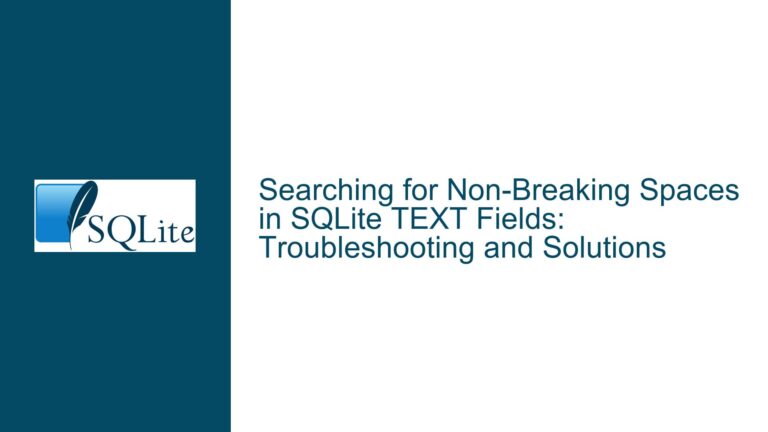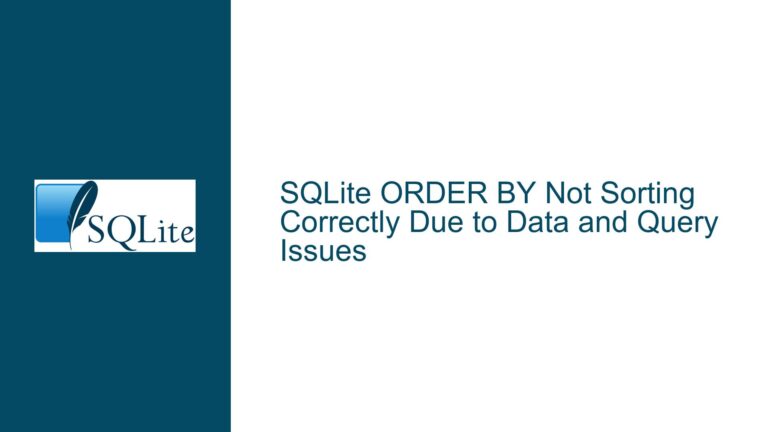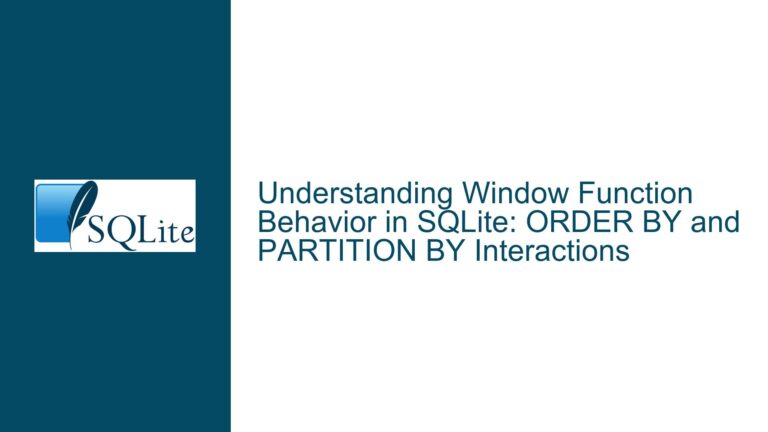SQLite LIKE Operator Truncates Binary Data at Null Bytes: Causes & Solutions
Issue Overview: LIKE Operator Fails to Match Binary Data with Embedded Zero Bytes
The SQLite LIKE operator is designed primarily for text pattern matching, but when applied to columns containing binary data (BLOBs) with embedded zero bytes (0x00), unexpected behavior occurs. Specifically, the LIKE comparison truncates the binary data at the first zero byte, leading to false positives or missed matches. For example, a BLOB value X’610062′ (hexadecimal for ‘a\0b’ in ASCII) will match patterns like ‘%a%’ or ‘%a’ because the zero byte causes the comparison to treat the data as a C-style null-terminated string. However, patterns searching for content beyond the zero byte (e.g., ‘%b%’) will fail, even though the ‘b’ exists in the full binary sequence. This behavior stems from SQLite’s internal handling of BLOBs in text-based operations, which involves implicit type conversions that discard data after the first zero byte.
The issue is exacerbated when developers mistakenly use text-centric operators like LIKE or GLOB on BLOB columns, assuming these operators process binary data in its entirety. While SQLite dynamically manages data types, this flexibility can lead to subtle bugs when binary data is treated as text. For instance, the query SELECT * FROM foo WHERE x LIKE '%b%'; returns no results for X’610062′ because the zero byte truncates the value to ‘a’ before the LIKE comparison occurs. Conversely, when the LIKE pattern itself is a BLOB (e.g., x LIKE X'610025'), SQLite performs a byte-for-byte comparison, avoiding truncation. This discrepancy highlights the critical distinction between text and binary data handling in SQLite.
Possible Causes: Implicit Text Conversion and Null-Terminated String Handling
1. Implicit Type Conversion of BLOBs to Text
SQLite uses a dynamic type system where values are stored as INTEGER, REAL, TEXT, BLOB, or NULL. When a BLOB is used in a text-based operation (e.g., LIKE, GLOB, or string functions), SQLite implicitly converts the BLOB to a TEXT value. This conversion treats the BLOB as a null-terminated C string, discarding all bytes after the first zero byte. For example, the BLOB X’610062′ is converted to the TEXT value ‘a’ (ASCII 0x61), ignoring the subsequent 0x00 and 0x62 bytes. Consequently, any pattern matching that relies on data beyond the first zero byte will fail.
2. LIKE Operator’s Reliance on Text Semantics
The LIKE operator is optimized for text patterns and does not support binary-safe comparisons. When the left-hand side (LHS) of LIKE is a BLOB, SQLite converts it to TEXT as described above. Similarly, if the right-hand side (RHS) pattern is a BLOB, SQLite converts it to TEXT unless the pattern is explicitly cast or treated as a BLOB. This leads to inconsistent results depending on how the pattern is formatted. For example, x LIKE X'610025' (where X’610025′ is the BLOB ‘a%’) works as a binary comparison, while x LIKE '%a%' uses text semantics, truncating the LHS BLOB at the first zero byte.
3. Ambiguity in Data Type Handling
Developers often assume that SQLite’s type affinity rules will preserve binary data integrity. However, when a column has no explicit affinity (e.g., CREATE TABLE foo(x);), SQLite stores values using their natural data type. Inserting a BLOB like X’610062′ ensures the column remains a BLOB, but subsequent text operations force conversions that alter the data. This ambiguity is a common source of errors when working with mixed data types.
Troubleshooting Steps, Solutions & Fixes: Handling Binary Data Safely in SQLite
Step 1: Identify Implicit BLOB-to-Text Conversions
Diagnostic Queries:
Use typeof(x) to determine how SQLite treats the column in queries:
SELECT x, typeof(x) FROM foo;
If the result shows blob for the column but text in WHERE clause operations, implicit conversions are occurring.
Example:
sqlite> SELECT x, typeof(x) FROM foo;
X'610062'|blob
sqlite> SELECT typeof(x) FROM foo WHERE x LIKE '%a%';
text
Step 2: Replace LIKE with Binary-Safe Functions
Solution: Use instr for Binary-Safe Searches
The instr(X,Y) function supports BLOBs and returns the position of the first occurrence of Y in X, treating both as binary data:
SELECT * FROM foo WHERE instr(x, X'62') > 0; -- Finds 'b' in X'610062'
Solution: Use hex for Text-Based Representations
Convert BLOBs to hexadecimal strings for text-based pattern matching:
SELECT * FROM foo WHERE hex(x) LIKE '%62%'; -- Matches 'b' in X'610062'
Step 3: Avoid Text Operations on BLOB Columns
Best Practice: Separate Text and Binary Data
Store binary data in dedicated BLOB columns and text data in TEXT columns. Avoid using text operators like LIKE on BLOB columns.
Schema Adjustment Example:
CREATE TABLE data (
id INTEGER PRIMARY KEY,
binary_data BLOB, -- For binary content
text_data TEXT -- For text content
);
Step 4: Use Explicit Casts or Custom Functions
Workaround: Cast BLOBs to Text with Replacements
Replace zero bytes with a non-zero placeholder before using LIKE:
SELECT * FROM foo WHERE replace(cast(x AS TEXT), char(0), '') LIKE '%b%';
Note: This approach risks data corruption if the original BLOB contains meaningful zero bytes.
Advanced Solution: User-Defined Functions (UDFs)
Create a custom SQL function to handle binary-safe pattern matching:
#include <sqlite3.h>
#include <string.h>
static void blob_like(sqlite3_context *ctx, int argc, sqlite3_value **argv) {
const unsigned char *blob = sqlite3_value_blob(argv[0]);
int blob_len = sqlite3_value_bytes(argv[0]);
const unsigned char *pattern = sqlite3_value_blob(argv[1]);
int pattern_len = sqlite3_value_bytes(argv[1]);
// Implement custom binary pattern matching logic
int result = memmem(blob, blob_len, pattern, pattern_len) != NULL;
sqlite3_result_int(ctx, result);
}
// Register the function in SQLite:
sqlite3_create_function(db, "blob_like", 2, SQLITE_UTF8, NULL, blob_like, NULL, NULL);
Usage:
SELECT * FROM foo WHERE blob_like(x, X'62'); -- Finds 'b' in BLOBs
Step 5: Validate Data Entries and Queries
Prevention: Enforce Strict Typing
Use explicit casts or CHECK constraints to prevent invalid data:
CREATE TABLE foo (
x BLOB CHECK (typeof(x) = 'blob')
);
Verification: Test Queries with Binary Data
Before deploying, test queries with BLOBs containing zero bytes:
INSERT INTO foo (x) VALUES (X'610062');
SELECT * FROM foo WHERE instr(x, X'6200'); -- Ensure binary-safe matching
Step 6: Consult SQLite Documentation and Community Resources
Reference:
- SQLite Documentation on Data Types
- SQLite Documentation on LIKE
Community Tools:
Use SQLite extensions like sqlean for enhanced binary handling:
-- Load sqlean extension
.load ./sqlean
-- Use regexp function for binary regex matching
SELECT * FROM foo WHERE regexp(X'62', x);
By following these steps, developers can avoid the pitfalls of implicit BLOB-to-text conversions and ensure reliable binary data handling in SQLite.






